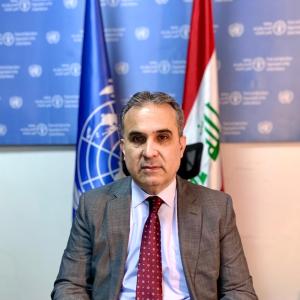Under the Patronage of H.E, the Minister of Agriculture, FAO Iraq, in close cooperation with the Ministry of Agriculture, has distributed high-quality fodder seeds to selected farmers to improve livestock productivity and animal nutrition in Nineveh
26 November 2020
Mosul 26 November 2020: FAO Iraq started its fodder seeds distribution for the first batch of livestock farmers' benefit of its EU-funded FAO project entitled: "Support of agricultural livelihoods of rural and peri-urban returnees and communities in Nineveh Governorate, Iraq”.
The distribution was conducted in the presence of Engineer Fahd Ali, the Associate Director of Agriculture of Nineveh, the Director of the Department of Livestock, FAO's Project Representative in Nineveh, and a number of livestock farmers.
Engineer Fahd Ali explained that the distribution of high-quality animal fodder seeds to 500 livestock farmers from the governorate would allow for the planting of 1000 dunoms of dedicated fodder crops, which nutritionally are of high quality that will improve the productivity of animal production. It is worth indicating that Nineveh governorate plays an important role in sheep farming for the domestic market and export.
FAO aims to improve various aspects of the whole livestock value chain; the project will undertake several interventions in the livestock sector by addressing milk hygiene, storage, fattening, and dairy processing through training sessions offered to livestock farmers, milk producers and equipping them with the necessary equipment. The beneficiaries have been selected based on a field survey carried out by FAO in cooperation with the Ministry's staff earlier in the year.
Dr. Salah Elhajj Hassan, FAO Representative in Iraq, wished to thank the EU for their generous support to help develop the agri-food sector in Iraq as well as the excellent cooperation received from the national and local authorities.
Dr. Chedly Kayouli, FAO livestock expert in charge of this project's activities, said that he was delighted to see the seeds' distribution on time before the planting season's arrival. He hoped this would also make a change possible for farmers to grow more livestock fodder crops, as there is clear demand for nutritious feed for animals.

He started his career in 1984, as Senior Research Assistant in the Agricultural Research and Education Centre (AREC), American University of Beirut. From 1987 to 1991, he was Coordinator of the Student Training Programme, and also Agriculture and Horticultural Teacher for the Faculty of Agriculture, at the Lebanese University.
From 1991 to 1995, he worked as Agricultural Engineer at the Ministry of Agriculture, Bekaa Regional Office, Zahlah and was then assigned to the Agricultural Research Institute in the Tal Amara station, first as Head of the Crop Production Department and subsequently in charge of the Plant Protection Laboratory. From 2002 to 2006, he was Director of the Kfardane Research Station (Agricultural Research Institute). In 2008, he became Visiting Scientist at the International Maize and Wheat Improvement Centre (CIMMYT) and Coordinator of a project with the International Centre for Atomic Energy Agency, Vienna.
In 2010, he served as Advisor to the Minister for Agriculture of Lebanon. In 2011, he became President of the Pesticide Scientific Committee, Head of the Phytoplasma Committee and Director of the Agriculture and Rural Development Programme (ARDP) (EU-funded project). From 2010 to 2013, he represented Lebanon in negotiations with EU, Egypt, Jordan and Iraq. During his career, Mr Hajj Hassan also carried out a number of other functions. He represented the Lebanese Agricultural Research Institute (LARI) in several research programmes with the International Centre for Agricultural Research in the Dry Areas (ICARDA) and the American University of Beirut. He was Coordinator of the Mashreq/Maghreb project with ICARDA, representing Lebanon in the Steering Committee, as well as being the Head of the Sugar-beet Delivery and of the Wheat Delivery Committees. For a number of years, Mr Hajj Hassan worked for the preparation of FAO TCP projects and served as the National Director of a TCP project. He joined FAO in January 2014 as FAO Representative in Yemen. Mr Hajj Hassan succeeds Mr El Zubi as FAO Representative in Iraq.





